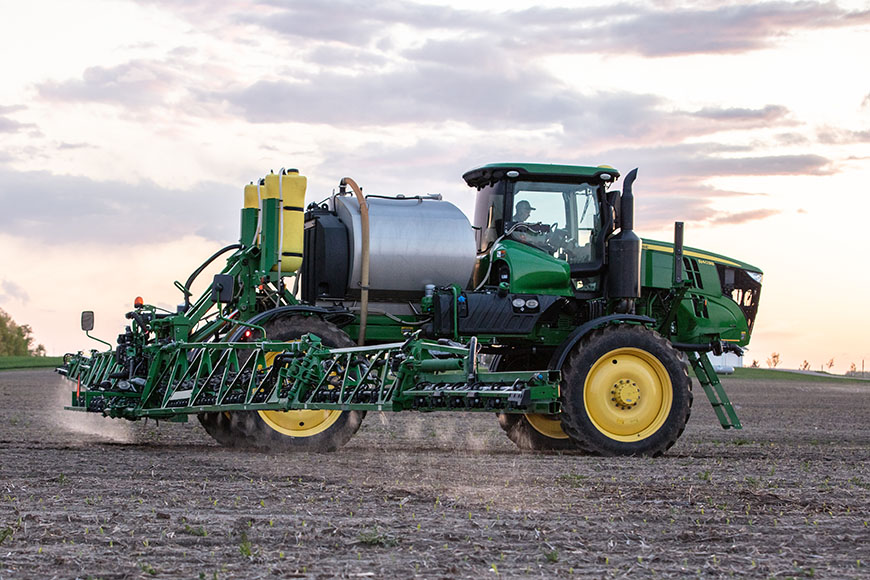Take a Full-Season Approach to Sunflower Weed Control

If you’re looking for ways to get your sunflower crop off to a strong start, effective weed control is critical. Since sunflowers are often planted at lower populations than other crops and grow relatively slowly during the first several weeks after emergence, they’re vulnerable to weed competition. A comprehensive weed management strategy that includes timely herbicide applications, the right tank mix partners and crop rotation can help maintain the yield and quality potential of your sunflowers. Now is a great time to get a start on sunflower weed control to stay ahead of competitive weeds next spring.
Start in the fall
A fall burndown is necessary to reduce grass and winter annual weed populations ahead of spring. Glyphosate plus Saddle-Up® herbicide offers excellent control of grass and broadleaf weeds to help you start clean. There are also plenty of residual herbicide options that you could include in your fall burndown for extended weed control. Work with your local agronomist to determine what residual products might be a good fit for your acres.
Follow up in the spring
While your fall burndown will help reduce weed populations going into spring, you’ll also need a spring burndown or preemergence herbicide application to keep newly emerged weeds at bay. The majority of kochia control will come from a preemergence herbicide application. Generally, you’ll want to include glyphosate plus a preemergence residual herbicide to ensure limited weed competition in the early weeks after sunflower emergence. Products that contain sulfentrazone plus an active ingredient for grass control such as Spartan® Elite herbicide are often an effective option.
Adding the right adjuvant can improve sulfentrazone herbicide performance because it’s an oil-loving herbicide. A methylated seed oil such as StrikeLock® adjuvant can help make your preemergence herbicide application work harder.
Consider postemergence options
Postemergence weed control offers farmers a last line of defense against weeds. There are basically three options for in-season control depending on your seed trait package.
-
Conventional sunflowers offer limited opportunities for postemergence weed control. There’s only one mode of action available for grass control and no options for broadleaf control. If you struggle with weeds in-season, it’s best to consider herbicide-tolerant seed varieties that offer more postemergence herbicide options.
-
Express®-tolerant sunflowers are a good option if Canada thistle is a problem in your fields. A postemergence application of Express herbicide can help control a variety of broadleaf weeds, although it’s not an effective option for kochia. Tank mixing with a methylated seed oil, including StrikeLock, can help improve herbicide uptake and weed control.
-
Clearfield® sunflowers are tolerant to Beyond® herbicide, which helps with nightshade control and offers activity against mustard species. Like Express, Beyond herbicide isn’t effective on kochia and also doesn’t offer much defense against Canada thistle. If you’re using the Clearfield System, adding an adjuvant like Class Act® NG® can help improve weed control. The Clearfield Plus System offers a greater tolerance to Beyond herbicide, so adding a methylated seed oil such as StrikeLock plus Class Act NG can help with herbicide uptake to improve weed control.
Extend crop rotations
One nonchemical consideration for weed control is crop rotation. Typically sunflowers are grown after wheat, and herbicide choices are limited due to plant back restrictions. When corn and soybeans are added to the rotation, effective herbicides against kochia and Canada thistle can be applied to help reduce those populations going into the wheat rotation.
Managing weeds in sunflowers takes a full-season approach and a well-executed plan. For more information on building an effective weed control strategy, speak with your locally owned and operated WinField United retailer.
Express® and Spartan® Elite are registered trademarks of FMC.
Beyond® and Clearfield® are registered trademarks of BASF.
All photos are either the property of WinField United or used with permission.
© 2019 WinField United. Important: Before use always read and follow label instructions. Crop performance is dependent on several factors many of which are beyond the control of WinField United, including without limitation, soil type, pest pressures, agronomic practices, and weather conditions. Growers are encouraged to consider data from multiple locations, over multiple years, and be mindful of how such agronomic conditions could impact results. Class Act® NG®, Saddle-Up®, StrikeLock® and WinField® are trademarks of WinField United.





